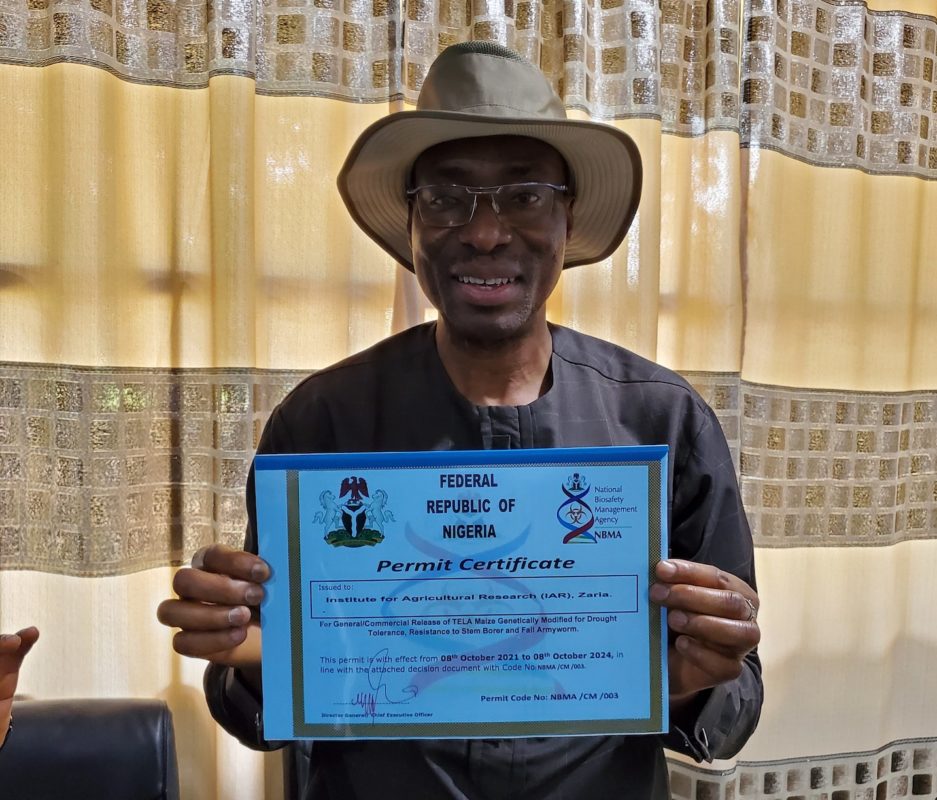Nigeria continues to emerge as a leader in Africa’s adoption of crop biotechnology, approving insect-resistant and drought-tolerant TELA maize for open cultivation.
The improved maize joins insect-resistant Bt cotton and pod borer-resistant Bt cowpea as genetically modified (GM) crops that can help Nigeria’s smallholder farmers reduce pesticide use, increase yields, support food security and respond to climate extremes.
Specifically, Nigeria’s National Biosafety Management Agency granted an environmental release permit that will allow the Institute for Agricultural Research (IAR) to start advanced yield or national performance trials on farmers’ fields in all of Nigeria’s major maize growing belts with the 2021-22 dry season. The seeds could be available for commercial release to farmers by the 2023 cropping season.
The TELA maize project, previously known as Water Efficient Maize for Africa (WEMA), is a public-private partnership that has developed both GM and conventional maize hybrids that provide drought resistance. The GM varieties also offer protection from some of the worst maize insect pests, including the corn borer and fall armyworm. South Africa has already commercialized the TELA varieties. Kenya and Mozambique have conducted successful field trials. Ethiopia and Tanzania are conducting similar research.
The partnership, which includes scientific and research collaboration, has helped TELA maize to advance efficiently through the development and regulatory process. Nigeria was involved in the TELA maize project for just three years before seeking the environmental release permit. By comparison, it took nearly a decade for Nigerian scientists to move the GM cowpea from concept to commercial release.
“This is the beginning of a new era for maize farmers in Nigeria who have suffered greatly from the twin problem of drought and devastating insect pests occasioned by climate change,” said Dr. Sylvester Oikeh, AATF TELA maize project manager. “The resources and time spent in protecting maize against insect pests will be used for other operations. The maize produced will provide healthier grains for farmers and consumers alike.”

“Preliminary trials with TELA hybrids have shown marked differences in yields,” said Prof. Rabiu Adamu, principal investigator of the IAR project. The TELA hybrids could produce up to 7.5 tonnes per hectare, as opposed to current commercial best hybrids that yield 6 tonnes per hectare.
“The benefit of TELA maize to Nigerian farmers will be quite enormous when hybrids are commercially released,” Adamu said. “It will drastically cut yield losses by farmers due to stem borers, fall armyworm and drought by more than 80 percent. This will boost farmers’ production and will generate more income as higher yields will be obtained.”
Listing more advantages of the crop, Prof. Mohammad Ishiyaku, executive director IAR, said it would lower farmers’ production costs as they would no longer have to spend so much on insecticides. TELA varieties can also germinate with even low amounts of rainfall.
“The cost of production is one thing that makes the eventual product expensive,” Ishiyaku said. “So, this is the benefit that farmers will have: they will have more income and we will have a safer environment because there will be no insecticide used to protect the maize.”
Though maize is an important staple food and the most widely grown crop in Nigeria, drought and insect pest pressures have suppressed yields. As a result, Nigeria is still unable to produce the estimated 20 million metric tonnes required annually to meet domestic demand. It currently imports about 8 million tonnes per year.
A similar situation exists with protein-rich cowpea, which is known as the poor man’s meat. GM cowpea, which offers farmers higher yields and a significant reduction in pesticide use, is expected to help reduce the need for imports.
“The deregulation of TELA maize by the NBMA is yet another big milestone achieved by the country in the agric-biotech space,” said Dr. Rose Gidado, NABDA deputy director and Nigeria country coordinator for the Open Forum on Agricultural Biotechnology (OFAB). “By the grant of this deregulation approval of the TELA maize, it means the gene of insert has been proven to be efficacious and safe for human consumption, animal feed and safe to the environment and so can be planted and commercialized by farmers for the improvement of their livelihood and the enhancement of food security. This also means hope for farmers as the varieties are high- yielding, drought-tolerant and stem borer- and fall armyworm-resistant. This is also the first time a [seed with a] stacked trait is being released in Nigeria as she takes the lead in Africa towards mitigating food security challenges.”
